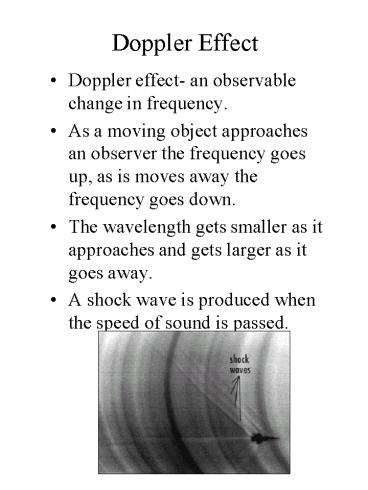Doppler Effect - PowerPoint PPT Presentation
1 / 8
Title:
Doppler Effect
Description:
Doppler Effect Doppler effect- an observable change in frequency. As a moving object approaches an observer the frequency goes up, as is moves away the frequency goes ... – PowerPoint PPT presentation
Number of Views:281
Avg rating:3.0/5.0
Title: Doppler Effect
1
Doppler Effect
- Doppler effect- an observable change in
frequency. - As a moving object approaches an observer the
frequency goes up, as is moves away the frequency
goes down. - The wavelength gets smaller as it approaches and
gets larger as it goes away. - A shock wave is produced when the speed of sound
is passed.
2
Which direction is the source moving?
3
Which direction is the source moving?To the
left! Notice the compression of wavelengths in
the front and the spreading of them behind.
RememberLarger frequency smaller wavelength!
4
fo is the frequency observed.fs is the actual
frequencyv is the velocity of waves in the
medium (Sound or light) vs is the velocity of
the source relative to the medium vo is the
velocity of the observer relative to the medium
fo fs(( 1 (vo/v))/ ( 1 (vs/v))
5
- Example A horn on a car with a frequency of 410
Hz is being sounded. The car is moving toward
you at 25 m/s the speed of sound is 331 m/s.
What frequency do you hear?
6
- Example A horn on a car with a frequency of 410
Hz is being sounded. The car is moving toward
you at 25 m/s the speed of sound is 330 m/s.
What frequency do you hear? - fo fs(( 1 (vo/v))/ ( 1 (vs/v))
- fo 410 Hz ((1 (0/331 m/s))/ (1- (25/331 m/s)
- Fo 443.5 Hz
- Note the observer is not moving hence the 0 for
vo. The source is coming toward you thus the -
is used in the denominator. Notice the math If
the observer is coming toward the source the top
is if the source is approaching the observer
then the bottom is negative. Reverse the signs
for the opposite happening.
7
A Red shift means it is moving away. A blue
shift it is coming toward you.
- Redshift of spectral lines in the optical
spectrum of a supercluster of distant galaxies
(right), as compared to that of the Sun (left).
8
When we look at the spectrum of the sun we get a
red shift on one side and a blue shift on the
other side. What does this tell us?































